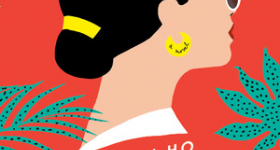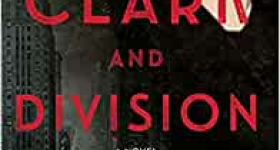In anticipation of Disney’s live-action Mulan movie opening at the end of March, Before the Sword by Grace Lin (Disney Press, February 2020, $16.99) introduces Mulan and a prophecy promising that either she or her sister will one day save the Emperor. The prequel is a beautifully crafted middle-grade fantasy. The story engages readers with vivid descriptions and a structure featuring short chapters and stand-alone stories with magic that feel right-sized for the young protagonist and including a puzzle-like quest for Mulan to solve. A theme familiar to those who remember Disney’s 1998 animated Mulan proves to be the heart of the story, as Mulan struggles to square disapproval of her unconventional strengths with her desire to bring honor to her family.
Evocative descriptions bring the narrative to life. Mulan’s mentor is the Jade Rabbit, an immortal being who can present himself in any shape. He first shows himself as a Healer after Mulan’s sister Xiu is bitten by venomous Daji, another shape-shifter and the villain of the story. The depiction of the Rabbit’s transformation is striking, ending with:
The Healer ... had turned into a rabbit. The rabbit bounded forward in a smooth, fluid motion, and Mulan saw that the Healer’s robes had also somehow transformed, becoming a bag that was slung across the rabbit’s back like a thin crescent moon. The sky was now tinged purple, the night finally winning its struggle with the sun. The rabbit leapt again, a silver, sinuous curve soaring above the grass.
Lin paints Daji in her human form in words that summon the same feeling of awe that C.S. Lewis’s description of the White Witch of Narnia evoked: “She was as exquisite as if she had been carved of jade, her face as delicate and as fine as a flower petal, and her black hair floating gently like a cloud.”
The reader’s senses are awakened when Daji gives Mulan a bottle of honey. The honey has “a thick sweet scent — rich and heavy. As she breathed in the fragrance, Mulan felt again the luxurious silk cloth, the warm tea, and Daji’s smooth fingers pressing against her hand.” When Mulan pours the honey, “A viscous golden stream slowly oozed from the bottle’s neck, glistening and shining. She watched it stretch from the bottle, a rope of liquid sunlight falling leisurely.”
Throughout, Mulan’s world is described with imagery and sensory detail. At the start of their journey, Mulan and Rabbit look up to the moon "in her full glory, a luminous pearl on black silk.” Later, arriving at a village, they are
... trudging down the narrow, stone-paved street, made even narrower by the peddlers and craftsmen selling sticks of candied fruit, giving haircuts, and sharpening knives. As they weaved in and around throngs of people and cars, a rich, delectable aroma began to fill Mulan’s nose. Her mouth watered, the scent of warm, sweet-savory meat and pastries tantalizing her.
In each situation, the language is colorful and evocative.
The book’s structure attracts readers of different levels by breaking the content into short chapters and stand-alone stories. The action comes in manageable bites, with many chapters only two to four pages long. The backstory is wrapped up in fairy-tale packages with intriguing names such as “The Unwanted Girl” and “Lu Ting-pin and the Sweet-Smelling Cakes.” The tales include magic and beauty and sadness. For example, here is a bit of “The Story of the Waiting Wife”:
And as the days began to grow longer and her husband still did not arrive, a chilling terror began to overtake her. Then one morning as she heard the icicles melting — their droplets falling to the ground like beads from a broken necklace — she knew she could wait no longer.
The story’s quest and magic feel appropriately sized for the young protagonist. Mulan’s mission to save her sister and the Rabbit, who have both been poisoned by Daji, involves piecing together a puzzle based on history and legend rather than leading legions of fighters into battle. The fairy-tale sections provide the puzzle pieces Mulan needs to complete her quest. The magic Mulan must learn to master involves mixing healing concoctions, avoiding poisons and recognizing good and evil in different forms. The requirements of the quest and the magic fall within Mulan’s reach. As a bonus, the format of the book makes it easy for the reader to review clues from the tales and solve the puzzle along with Mulan.
The story develops a relatable theme: Mulan struggles to grow beyond social convention to discover that her perceived weaknesses are actually strengths. Mulan initially mistakes power for awkwardness: “She shook her head in chagrin. She was always such a clumsy egg, like the time she’d been playing with the boys and kicked the ball so hard that it flew past them and broke the shrine statue. …” She assumes her mother is ashamed when Mulan breaks a mortar in half by pounding rice into flour “with all her might,” and her mother cries, “Mulan! What are you doing? Control yourself!”
Neither Mulan nor the evil Daji can believe that Mulan rather than her sister Xiu may be destined to save the Emperor. Mulan thinks Xiu is “the perfect daughter — conscientious, attentive and obedient. Not like herself, so careless and headstrong.” Daji becomes a nine-legged spider to stalk Mulan’s sister, believing Xiu is the future hero because Mulan is only
... an infuriating nuisance, always in the way and always somehow stopping them [from attacking Xiu] with her clomping feet or sudden movements. “Obviously,” Daji had said, “she is not the one we want. That clumsy calf could never save the Emperor.”
Mulan begins to appreciate her own skills as she journeys with the Rabbit. They stop at a village where, thinking of her own clumsiness, Mulan feels envious of a graceful girl she meets. But then she remembers one of her past mistakes, possibly recognizing for the first time that her mother’s disapproval had veiled a triumph:
Once, she had accidentally hit the table as she ran into the house, and the family’s prized teacup flew up into the air. Mulan had flung herself down, skidded across the floor, and narrowly caught the cup in her outstretched hand. Even though she had saved the cup, Ma had still been horrified.
When her journey is almost complete, Mulan feels her father’s acceptance, seeing his attitude toward her reflected in the Queen of the Immortals:
Ba often looked at her that way, with that same tender smile mixed with sorrow; and Mulan realized it was the pain of loving someone without being able to stop their suffering. To see the powerful Queen Mother of the West, the Queen of the Immortals, with that same grief was like seeing her illuminated with light. Mulan realized that, through all the grandeur and ceremony, the queen was a being of true compassion and kindness.
In the Queen’s garden, Mulan has a choice to make. Daji tempts her to taste a peach, one of the prized and forbidden Fruits of Longevity. Fortunately, Mulan has her developing sense of self-worth to lean on:
It’s the peach you want, Daji had said. But it wasn’t what Mulan wanted. It was what Daji wanted. Your job is to bring honor to your family, Ba had said. Doing what Daji wanted could never be honorable.
Many fans of the animated Mulan will remember the line, “My little baby is all grown up and saving China.” Mulan may go on to save China in Disney’s upcoming live-action movie, but in Before the Sword, it is enough that she gets to know the Jade Rabbit and, most importantly, begins to know her own value.










Comments